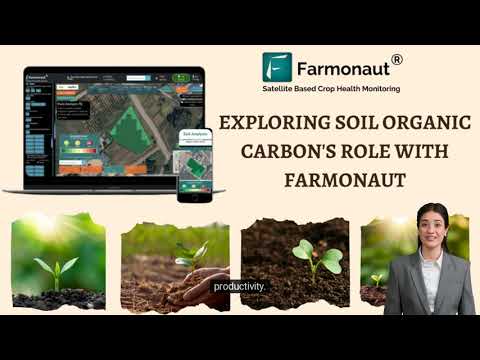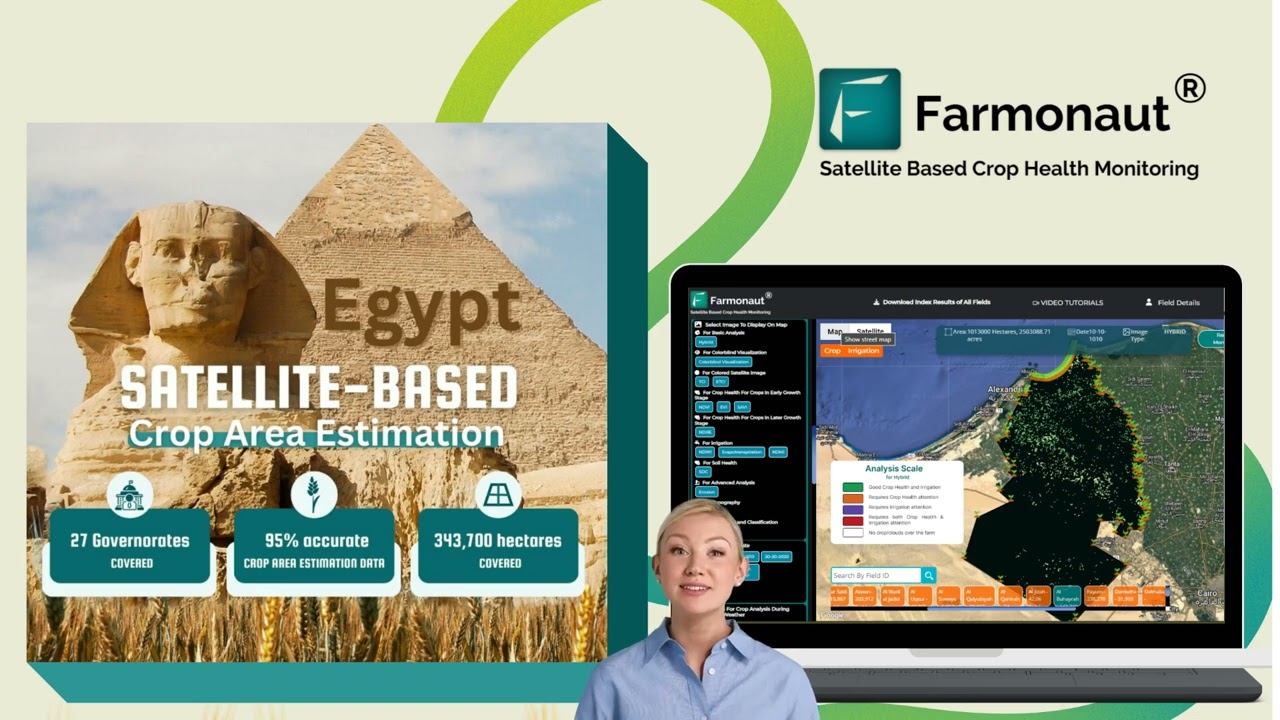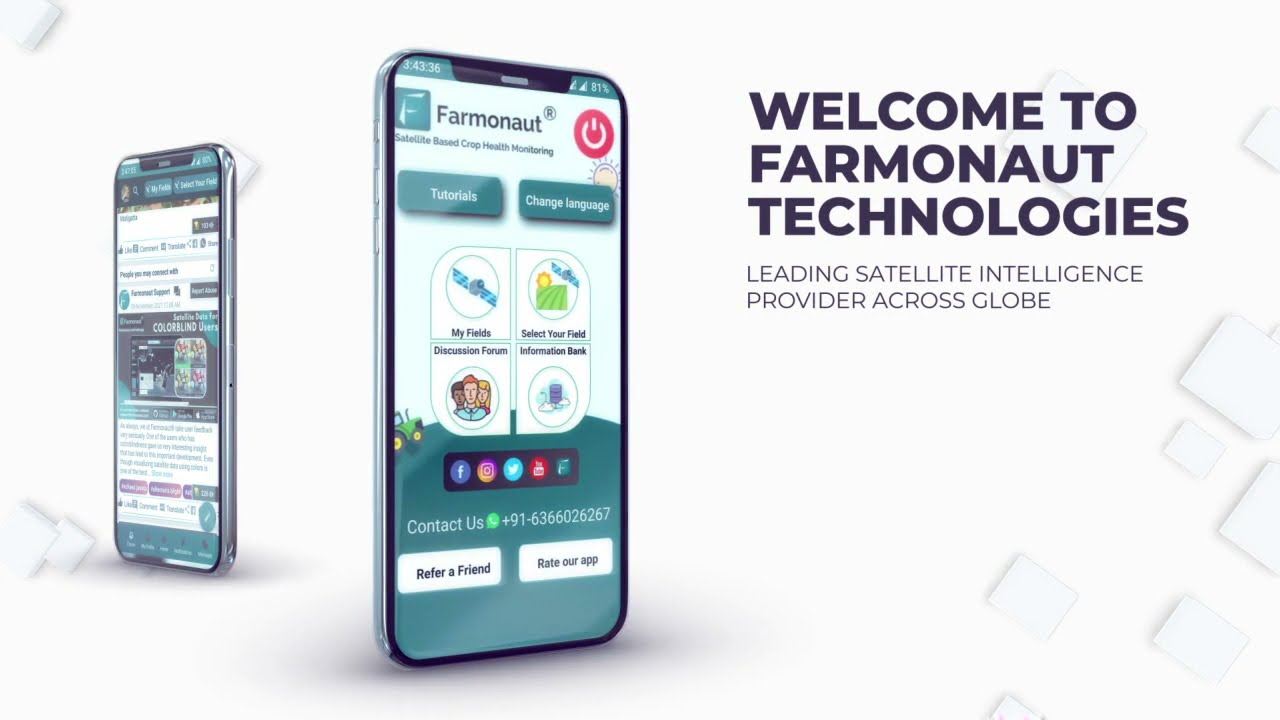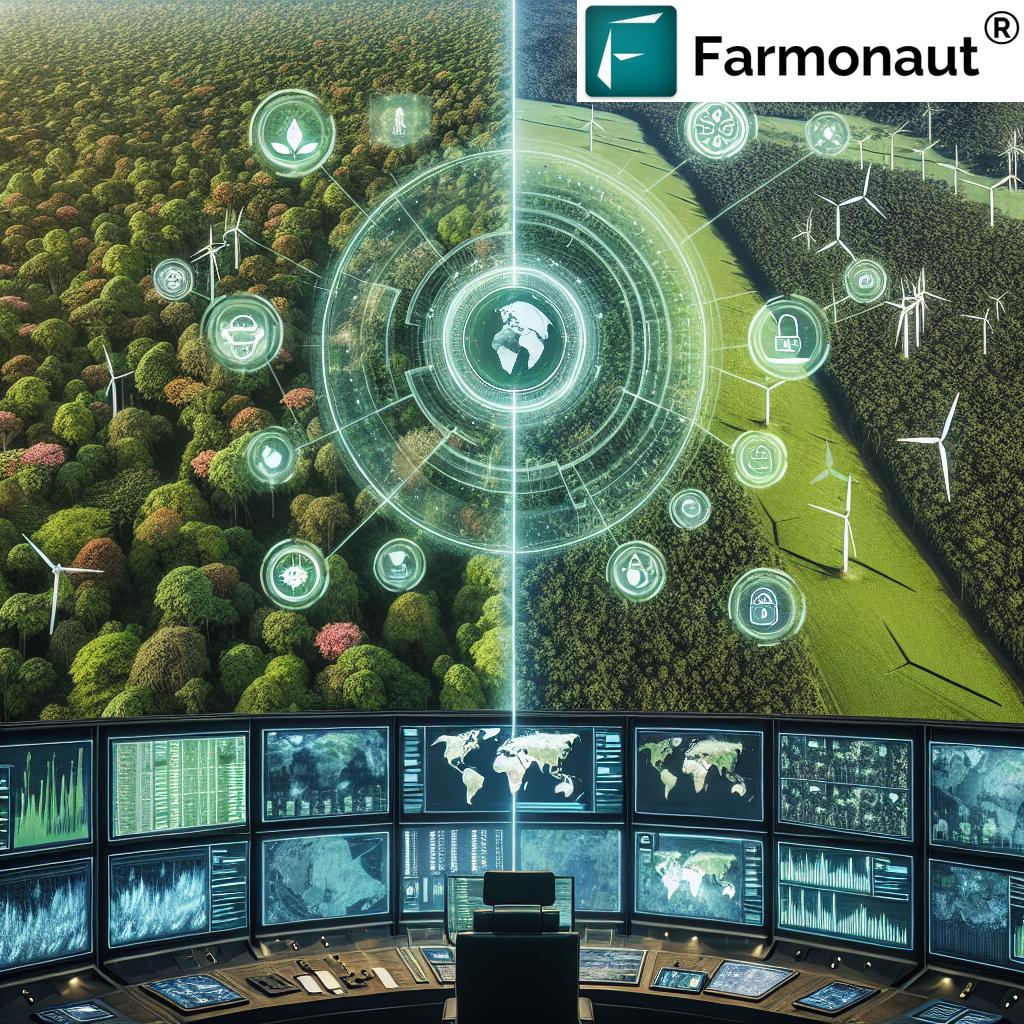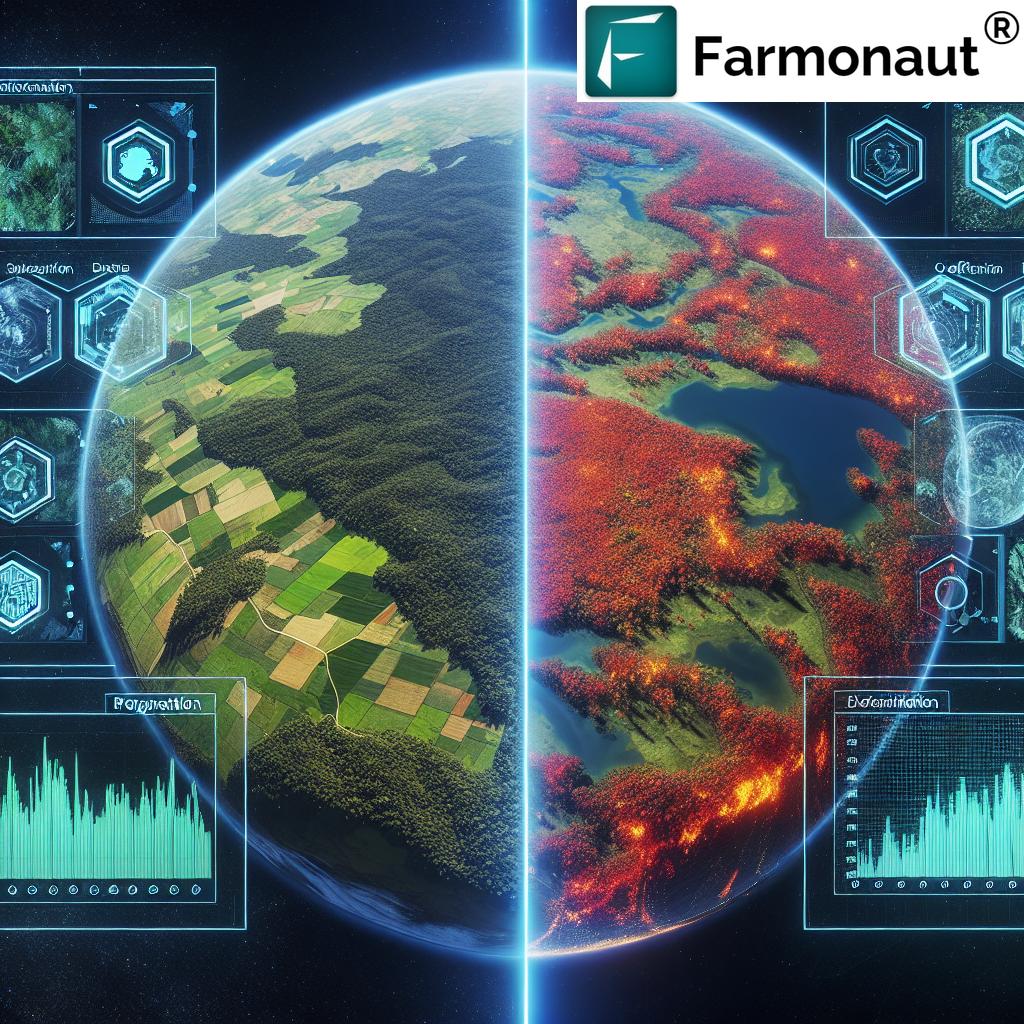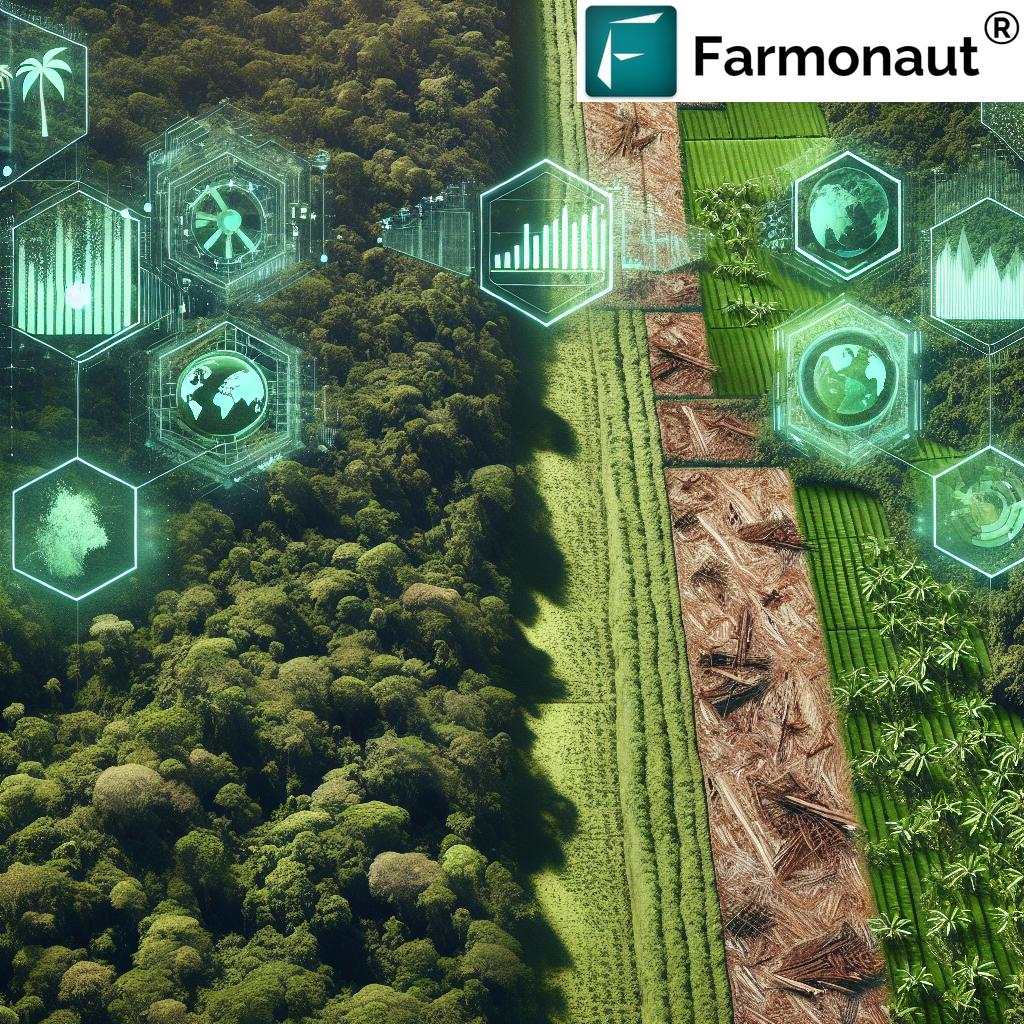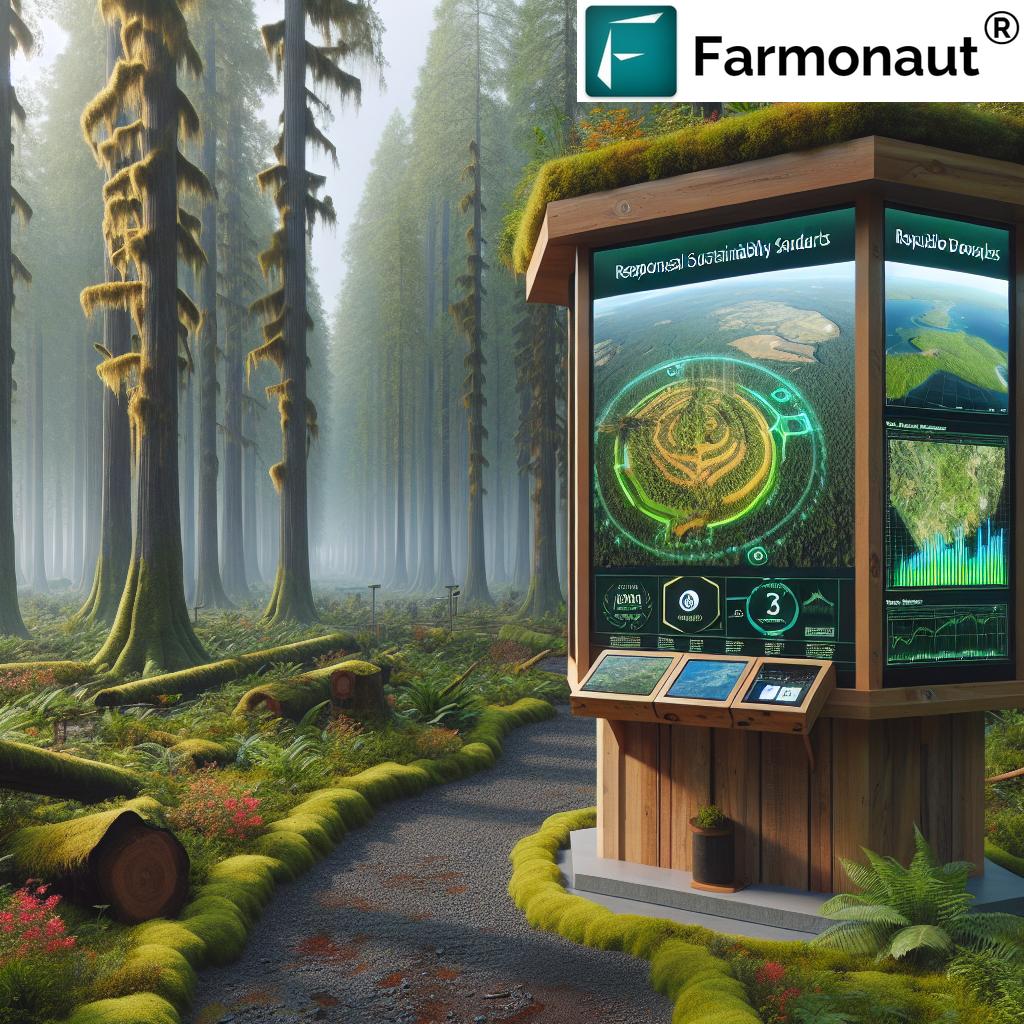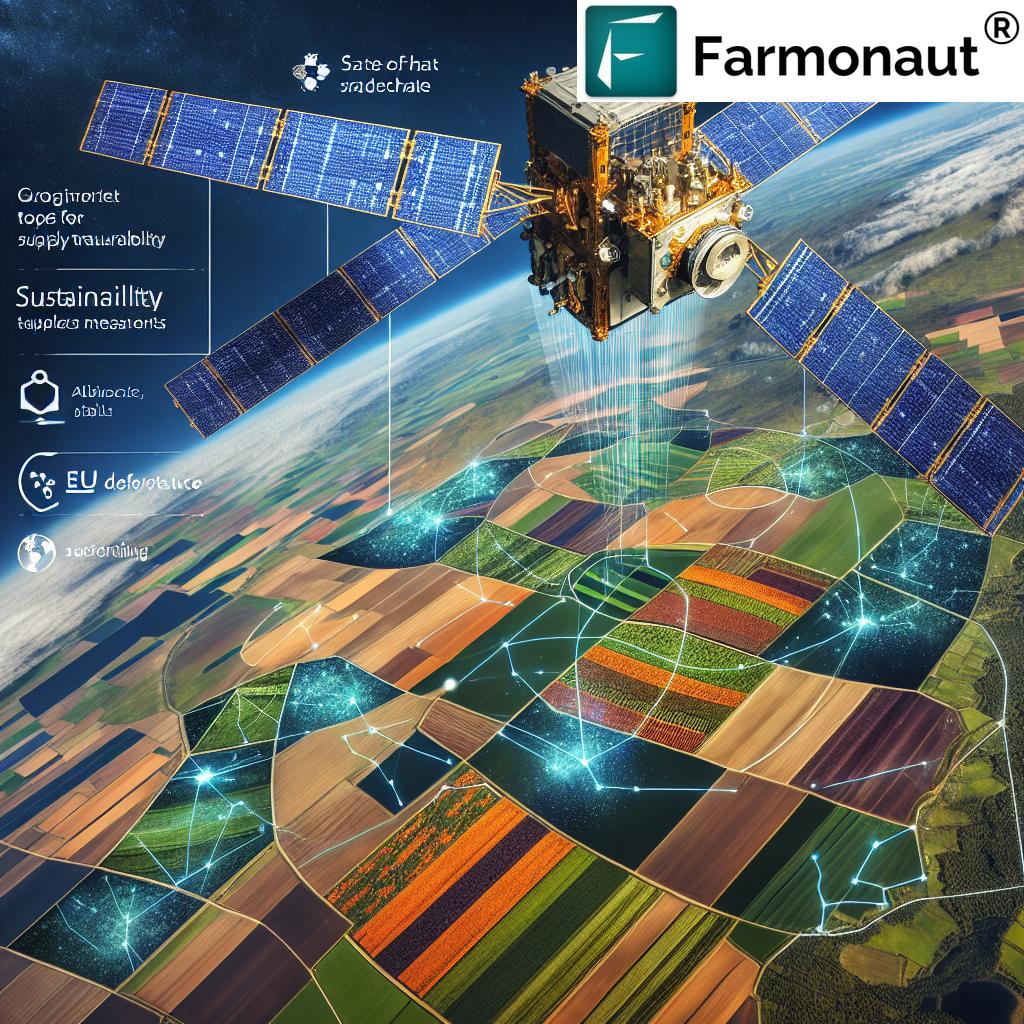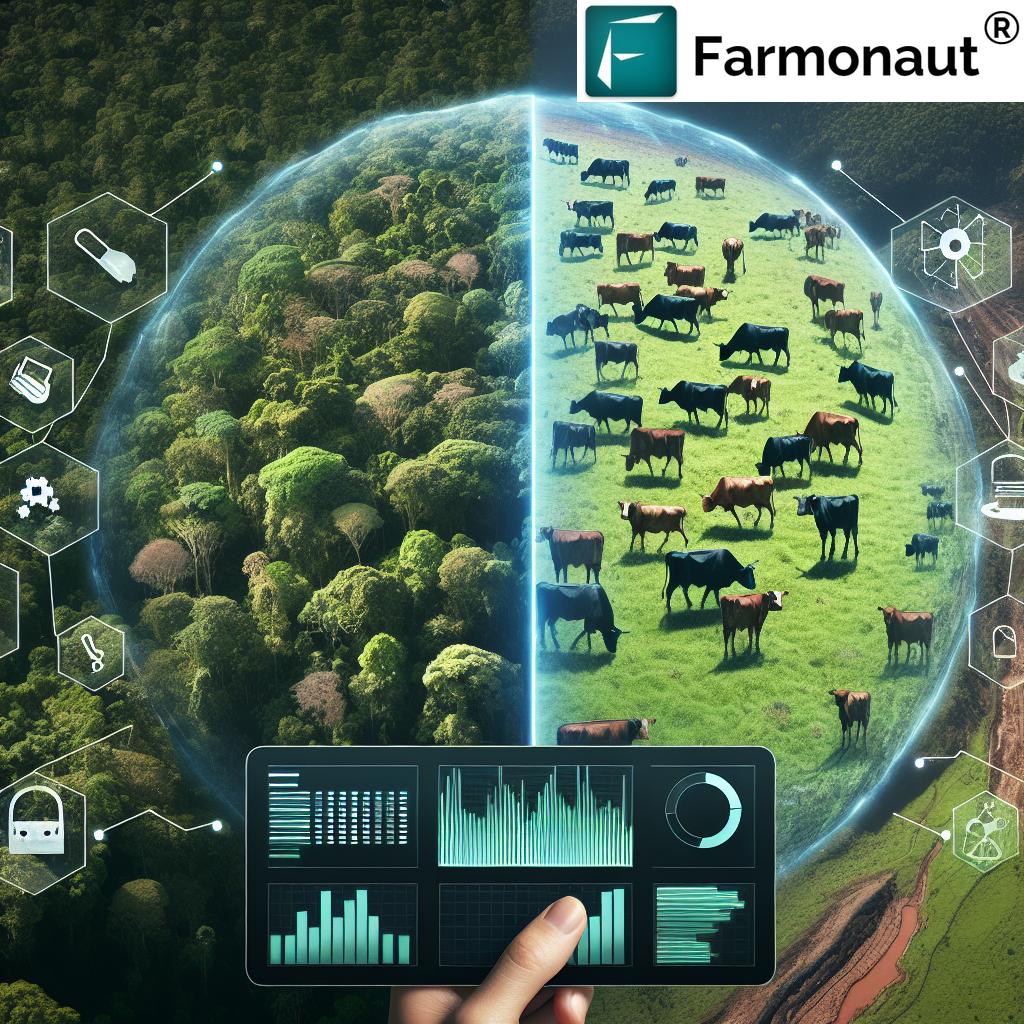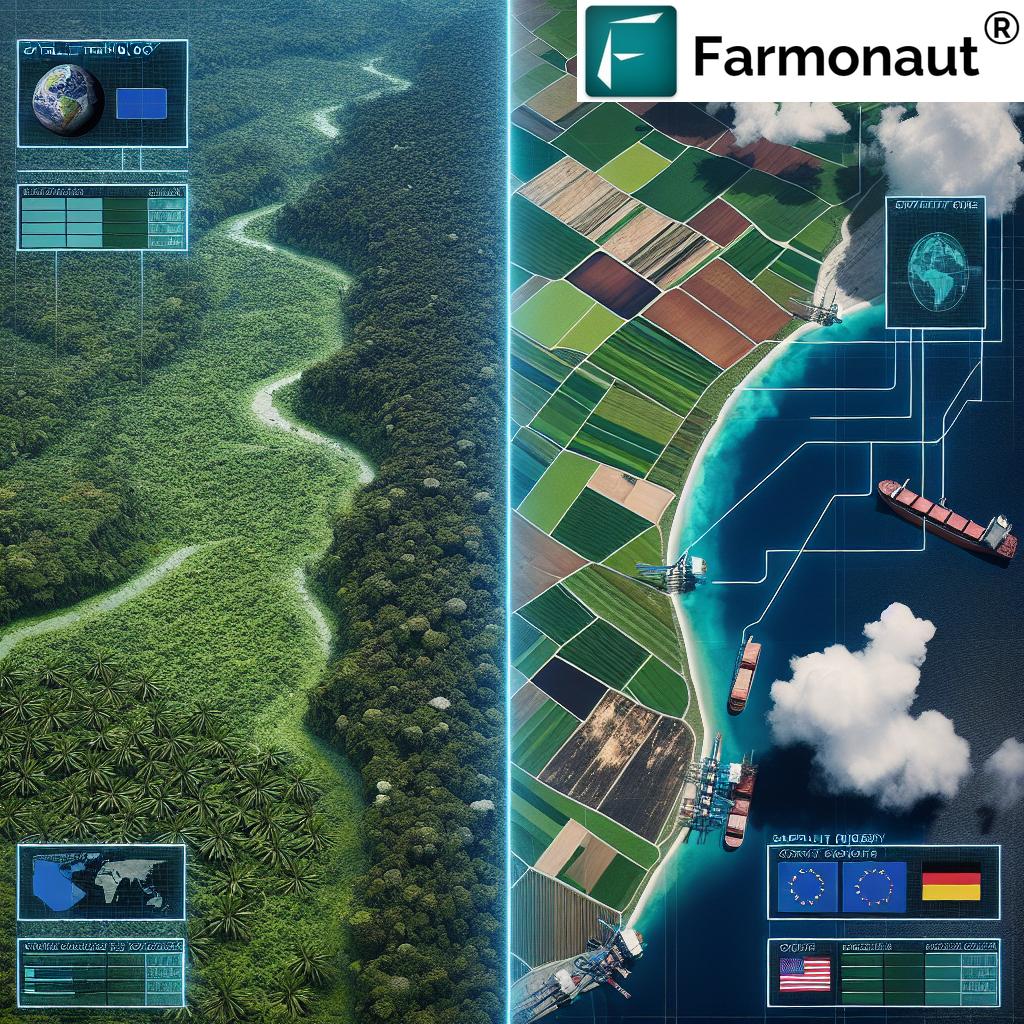From Disposable to Sustainable: How EU Deforestation Regulation Transforms Paper Packaging and Coffee Supply Chains
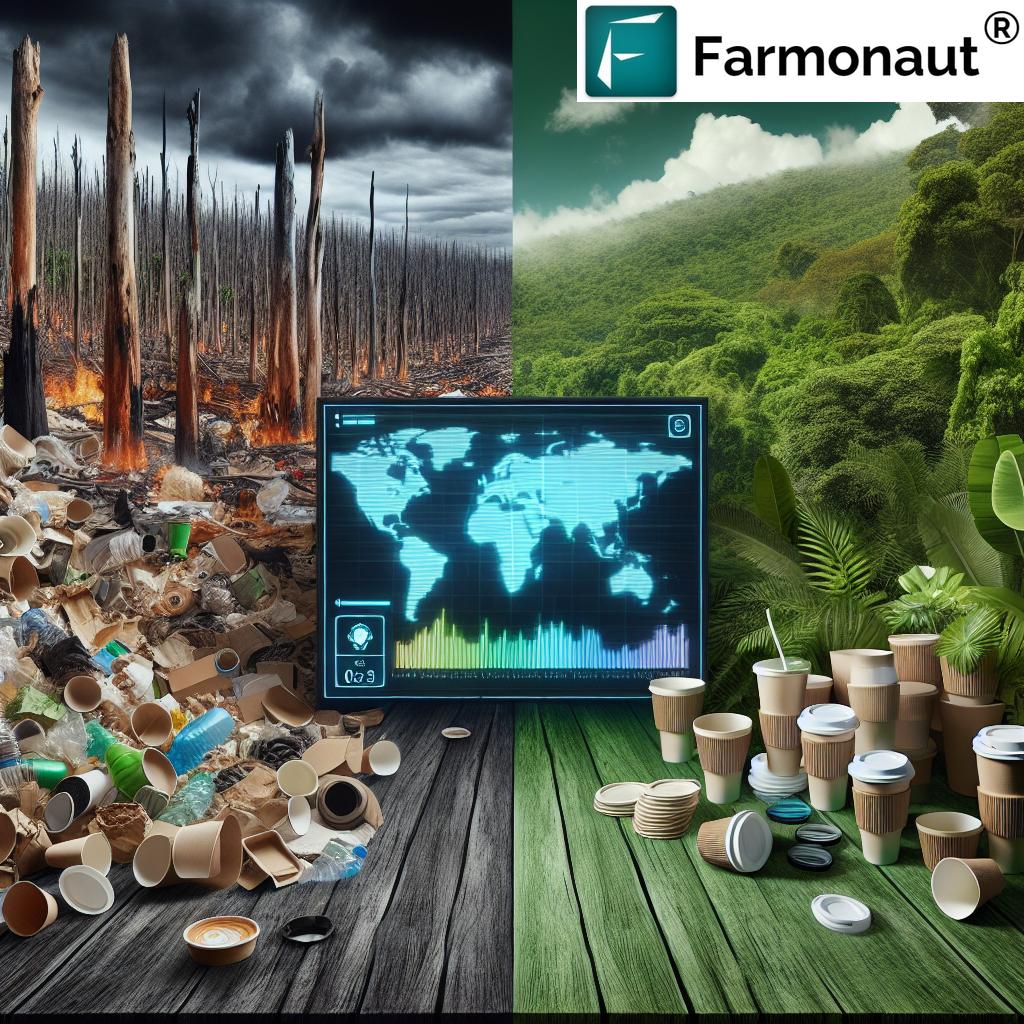
In today’s fast-paced world, our morning coffee ritual often comes with an environmental price tag that extends far beyond the cost of our favorite brew. As we cradle our disposable cups, few of us realize the hidden impact our daily habits have on the world’s forests and the delicate balance of our ecosystem. At Farmonaut, we’re committed to leveraging technology for sustainable agriculture, and we believe it’s crucial to understand the broader context of environmental challenges, including those posed by everyday items like coffee cups and paper packaging.
“Over 50% of major companies lack policies for sustainable sourcing of forest-risk commodities like paper and coffee.”
This eye-opening statistic underscores the urgent need for change in how we approach the production and consumption of these everyday items. As we delve into the complexities of supply chains and environmental regulations, we’ll explore how the EU Deforestation Regulation is set to revolutionize the way we think about and manage our resources.
The Hidden Environmental Costs of Disposable Coffee Cups
Our love affair with convenience has led to a staggering increase in the use of disposable coffee cups. These seemingly innocuous containers carry a hefty environmental burden that extends far beyond their brief moment of use. Let’s break down the impact:
- Deforestation: The production of paper cups contributes significantly to global deforestation. Each year, millions of trees are felled to meet the demand for disposable cups.
- Carbon Footprint: The entire lifecycle of a disposable cup, from production to disposal, releases greenhouse gases that contribute to climate change.
- Waste Generation: Most disposable cups end up in landfills, where they can take decades to decompose, releasing methane in the process.
- Water Pollution: The chemicals used in the production of paper cups and their plastic linings can leach into water systems, causing pollution.
These environmental costs are often hidden from consumers, but their impact is far-reaching and long-lasting. As we at Farmonaut work to promote sustainable farming practices, we recognize that the challenges of sustainability extend throughout the supply chain, from farm to cup.
The Link Between Deforestation and Everyday Products
The connection between our daily coffee habit and the health of global forests might not be immediately apparent, but it’s a crucial link in understanding the broader environmental impact of our consumption patterns. Forests play a vital role in regulating our climate, preserving biodiversity, and supporting livelihoods around the world. Yet, they’re under threat from various industries, including paper and coffee production.
At Farmonaut, we’re committed to using satellite technology to monitor and improve land use in agriculture. While our focus is on crop health and sustainable farming practices, we recognize the importance of addressing deforestation across all sectors. The paper and coffee industries are significant contributors to this global challenge:
- Paper Production: The pulp and paper industry is one of the largest industrial consumers of wood, contributing to deforestation, particularly in tropical and boreal forests.
- Coffee Cultivation: As demand for coffee grows, so does the pressure to clear forests for new plantations, especially in biodiversity hotspots like the Amazon and Central America.
Understanding these connections is crucial for developing effective strategies to combat deforestation and promote sustainable supply chain management.
Alarming Statistics: Companies Lacking Sustainable Sourcing Policies
The lack of comprehensive sustainable sourcing policies among major companies is a significant obstacle in the fight against deforestation. Our research reveals some concerning trends:
- Over 50% of major companies in the paper and coffee industries have inadequate or no policies for sustainable sourcing of forest-risk commodities.
- Only a small percentage of companies can trace their supply chains back to the source, making it difficult to ensure sustainable practices.
- Many businesses are unaware of the full environmental impact of their sourcing decisions, particularly regarding deforestation.
These statistics highlight the urgent need for improved transparency and accountability in global supply chains. At Farmonaut, we believe that technology can play a crucial role in addressing these challenges. Our satellite-based monitoring systems, while primarily focused on agricultural applications, demonstrate the potential for technology to enhance supply chain visibility and promote sustainable practices.
Explore Farmonaut’s sustainable agriculture solutions

The EU Deforestation Regulation: A Game-Changer for Supply Chain Management
In response to the pressing need for action against global deforestation, the European Union has introduced the EU Deforestation Regulation. This groundbreaking legislation is set to transform the way companies manage their supply chains, particularly in industries linked to forest-risk commodities like paper and coffee.
“The EU Deforestation Regulation aims to reduce global forest loss by 50% by 2030, impacting paper and coffee supply chains.”
Key aspects of the EU Deforestation Regulation include:
- Due Diligence Requirements: Companies must conduct thorough assessments of their supply chains to ensure products are not linked to deforestation.
- Traceability Mandates: Businesses will need to implement robust traceability systems to track products from source to shelf.
- Reporting Obligations: Regular reporting on supply chain risks and mitigation measures will be required.
- Penalties for Non-Compliance: Significant fines and potential market exclusion for companies that fail to meet the regulation’s requirements.
This regulation represents a significant shift in how global trade operates, placing a strong emphasis on environmental protection and sustainable sourcing practices. For companies in the paper packaging and coffee industries, compliance with these new rules will require substantial changes to their operations and supply chain management strategies.
The Critical Role of Forests in Climate Regulation and Biodiversity
To fully appreciate the importance of the EU Deforestation Regulation, it’s essential to understand the vital role that forests play in our global ecosystem. Forests are not just collections of trees; they are complex, living systems that provide numerous environmental services:
- Carbon Sequestration: Forests act as natural carbon sinks, absorbing and storing vast amounts of CO2 from the atmosphere.
- Biodiversity Hotspots: They are home to an incredible diversity of plant and animal species, many of which are found nowhere else on Earth.
- Climate Regulation: Forests help regulate local and global climate patterns through processes like evapotranspiration.
- Water Cycle Management: They play a crucial role in the water cycle, helping to prevent soil erosion and maintain water quality.
- Socio-Economic Benefits: Millions of people worldwide depend on forests for their livelihoods and cultural heritage.
At Farmonaut, our work in sustainable agriculture aligns closely with the goals of forest conservation. By promoting efficient land use and precision farming techniques, we aim to reduce the pressure on forested areas for agricultural expansion. Our satellite-based monitoring systems can help identify areas at risk of deforestation, supporting efforts to protect these vital ecosystems.
Explore Farmonaut’s API for environmental monitoring
Beyond Recycling: The Benefits of Reusing Over Recycling
While recycling has long been touted as a solution to our waste problems, it’s important to recognize its limitations, especially when it comes to disposable coffee cups and paper packaging. The reality is that recycling alone is not enough to address the environmental challenges we face. Here’s why reusing is often a better option:
- Energy Efficiency: Reusing requires significantly less energy than recycling, which involves reprocessing materials.
- Resource Conservation: By reusing items, we reduce the demand for new resources, including trees for paper production.
- Waste Reduction: Reusable containers eliminate the need for single-use items, significantly reducing waste generation.
- Cost-Effective: Over time, reusable options often prove more economical for both consumers and businesses.
The shift towards reusable packaging and containers aligns with the broader goals of sustainability and resource conservation. At Farmonaut, we advocate for efficient resource use in agriculture, and we see parallels in the need for more sustainable packaging solutions across industries.
Sustainable Alternatives to Disposable Containers
As awareness of the environmental impact of disposable containers grows, innovative sustainable alternatives are emerging. These solutions aim to provide the convenience consumers expect while minimizing environmental harm:
- Reusable Coffee Cups: Made from durable materials like stainless steel, glass, or bamboo, these cups can be used hundreds of times.
- Biodegradable Packaging: Containers made from plant-based materials that break down naturally without leaving harmful residues.
- Edible Packaging: Innovative solutions like edible coffee cups made from biscuit material lined with chocolate.
- Recycled Paper Products: Packaging made from 100% recycled materials, reducing the need for virgin pulp.
- Deposit Return Schemes: Systems where consumers pay a small deposit for reusable containers, which is refunded upon return.

These alternatives demonstrate that sustainability and convenience are not mutually exclusive. By adopting these solutions, businesses can reduce their environmental footprint while meeting consumer demands for eco-friendly options.
Commodity-Driven Deforestation Prevention: A Global Imperative
Addressing commodity-driven deforestation is crucial for protecting our planet’s vital resources. The EU Deforestation Regulation is a significant step in this direction, but global cooperation and innovative solutions are needed to truly tackle this challenge. Here are some key strategies for preventing commodity-driven deforestation:
- Supply Chain Transparency: Implementing robust traceability systems to track products from source to shelf.
- Sustainable Certification Programs: Supporting and strengthening certification schemes for sustainably sourced products.
- Technological Innovation: Utilizing satellite monitoring and blockchain technology to verify sustainable sourcing claims.
- Corporate Accountability: Encouraging companies to set and adhere to ambitious deforestation-free commitments.
- Consumer Education: Raising awareness about the impact of consumer choices on global forests.
At Farmonaut, we’re proud to contribute to these efforts through our advanced agricultural technologies. Our satellite-based monitoring systems can help identify areas at risk of deforestation and support sustainable land use practices. By providing farmers and agribusinesses with precise data and insights, we aim to promote more efficient and sustainable agricultural practices that reduce pressure on forested areas.
Learn more about Farmonaut’s API Developer Docs
Positive Trends in Corporate Responsibility
While the challenges of deforestation and unsustainable packaging remain significant, there are encouraging signs of progress in corporate responsibility. Many companies are taking proactive steps to address these issues:
- Zero Deforestation Commitments: An increasing number of companies are pledging to eliminate deforestation from their supply chains.
- Investment in Sustainable Packaging: Major brands are investing in research and development of eco-friendly packaging solutions.
- Supply Chain Transparency Initiatives: Some companies are voluntarily disclosing their supply chain information to promote accountability.
- Collaboration with NGOs: Partnerships between corporations and environmental organizations are driving positive change.
- Adoption of Circular Economy Principles: More businesses are embracing circular economy models to reduce waste and maximize resource efficiency.
These trends demonstrate that corporate responsibility is evolving from a niche concern to a mainstream business imperative. As regulations like the EU Deforestation Regulation come into effect, we expect to see even more companies prioritizing sustainability in their operations.
The Power of Consumer Choices
While regulations and corporate initiatives are crucial, individual consumer choices play a significant role in driving sustainable practices. Every time we choose a reusable cup over a disposable one or opt for products with sustainable packaging, we send a powerful message to businesses and policymakers. Here’s how consumers can contribute to protecting our planet’s resources:
- Choose Reusable Options: Invest in high-quality reusable coffee cups and containers.
- Support Sustainable Brands: Prioritize products from companies with strong environmental commitments.
- Reduce Overall Consumption: Be mindful of your purchasing habits and avoid unnecessary waste.
- Educate Yourself: Stay informed about the environmental impact of your choices.
- Advocate for Change: Support policies and initiatives that promote sustainability and forest conservation.
At Farmonaut, we believe in empowering individuals with knowledge and tools to make sustainable choices. While our primary focus is on agricultural technology, we recognize that consumer awareness and action are essential components of a more sustainable future.
Download Farmonaut’s mobile apps to learn more about sustainable agriculture:


Comparison of Disposable vs. Sustainable Coffee Cup Options
| Cup Type | Environmental Impact | Estimated Lifespan | Carbon Footprint (CO2 emissions per cup) | Deforestation Impact | Recyclability | Cost per Use |
|---|---|---|---|---|---|---|
| Disposable Paper | High | Single-use | 0.11 kg | High | Limited | $0.10 – $0.20 |
| Reusable Ceramic | Low (if used multiple times) | 3-5 years | 0.02 kg (per use, assuming 1000 uses) | Low | No | $0.01 – $0.05 (per use) |
| Biodegradable | Medium | Single-use, but decomposes faster | 0.08 kg | Medium | Yes (in industrial facilities) | $0.15 – $0.25 |
| Reusable Stainless Steel | Very Low (if used long-term) | 10+ years | 0.01 kg (per use, assuming 3000 uses) | Very Low | Yes | $0.005 – $0.02 (per use) |
This table clearly illustrates the long-term benefits of reusable options in terms of environmental impact, cost-effectiveness, and sustainability. While disposable cups may seem convenient, their cumulative environmental cost is significant. Sustainable alternatives, though initially more expensive, prove to be more economical and environmentally friendly over time.
The Role of Technology in Sustainable Supply Chain Management
As we navigate the challenges of implementing sustainable practices in paper packaging and coffee supply chains, technology emerges as a powerful ally. At Farmonaut, we’re at the forefront of leveraging advanced technologies to promote sustainable agriculture, and we see similar potential for innovation in supply chain management:
- Satellite Monitoring: Just as we use satellite imagery for crop health monitoring, similar technology can track forest cover and detect deforestation in real-time.
- Blockchain for Traceability: Blockchain technology can create transparent, tamper-proof records of product origins and supply chain movements.
- AI and Machine Learning: These technologies can analyze vast amounts of data to identify patterns and predict areas at risk of deforestation.
- IoT Sensors: Internet of Things devices can monitor environmental conditions and resource use throughout the supply chain.
- Data Analytics: Advanced analytics tools can help companies optimize their supply chains for sustainability and efficiency.
By embracing these technologies, companies can gain unprecedented visibility into their supply chains, making it easier to identify and address sustainability challenges. At Farmonaut, we’re committed to developing and refining these technologies to support sustainable practices across industries.
Looking Ahead: The Future of Sustainable Packaging and Supply Chains
As we conclude our exploration of the transformative impact of the EU Deforestation Regulation on paper packaging and coffee supply chains, it’s clear that we’re at a pivotal moment in the journey towards sustainability. The challenges are significant, but so too are the opportunities for innovation and positive change.
Looking to the future, we anticipate:
- Accelerated Innovation: The push for sustainability will drive rapid advancements in eco-friendly packaging materials and technologies.
- Increased Collaboration: We expect to see more partnerships between businesses, NGOs, and governments to address complex sustainability challenges.
- Consumer-Driven Change: As awareness grows, consumer demand for sustainable products will continue to shape industry practices.
- Global Policy Alignment: Other regions may follow the EU’s lead, creating a more unified global approach to combating deforestation.
- Integration of Sustainability Metrics: Environmental impact will increasingly be factored into business performance evaluations and investment decisions.
At Farmonaut, we’re excited to be part of this sustainable future. While our primary focus remains on agricultural technology, we recognize the interconnectedness of all sustainability efforts. By promoting efficient, data-driven farming practices, we contribute to the broader goal of reducing pressure on global forests and natural resources.
As we move forward, let’s remember that every choice we make – from the coffee cup we use to the food we eat – has the power to shape our world. By staying informed, supporting sustainable practices, and embracing innovation, we can all play a part in creating a more sustainable, forest-friendly future.
Frequently Asked Questions (FAQ)
- What is the EU Deforestation Regulation?
The EU Deforestation Regulation is a set of rules aimed at reducing global deforestation by requiring companies to ensure their products are not linked to recently deforested areas. - How does the coffee industry contribute to deforestation?
Coffee production can lead to deforestation when forests are cleared to create new plantations, especially in tropical regions with high biodiversity. - What are some sustainable alternatives to disposable coffee cups?
Sustainable alternatives include reusable cups made from materials like stainless steel, glass, or bamboo, as well as biodegradable cups made from plant-based materials. - How can consumers contribute to reducing deforestation?
Consumers can help by choosing products with sustainable certifications, using reusable containers, and supporting brands with strong environmental commitments. - What role does technology play in preventing deforestation?
Technology like satellite monitoring, blockchain for traceability, and AI can help track and prevent deforestation by providing real-time data and supply chain transparency.
As we continue to navigate the complex landscape of sustainability and environmental protection, it’s crucial to stay informed and take action where we can. At Farmonaut, we’re committed to providing innovative solutions that support sustainable agriculture and environmental stewardship. Together, we can work towards a future where our daily conveniences don’t come at the cost of our planet’s health.



